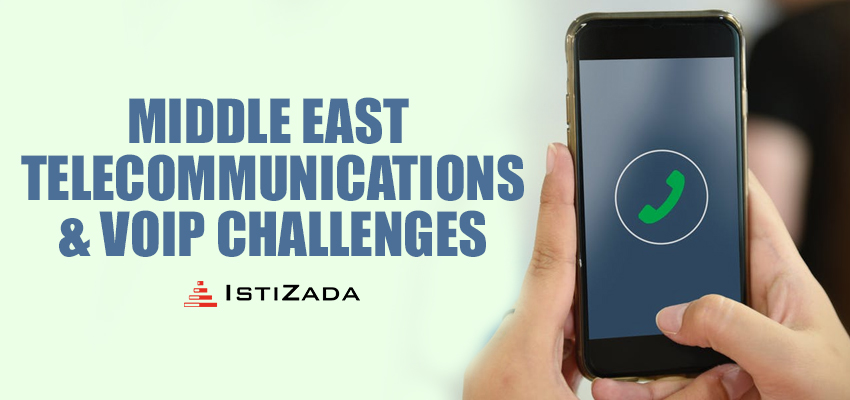
Those who live within the Middle East or have spent time there have no doubt encountered difficulties using internet services to contact people outside the region. In a GCC country, you likely found that calls via WhatsApp, Facetime, and Skype were blocked. Likewise, if you were trying to reach a local in one of these countries, you may have experienced an unusually poor connection due to a short bandwidth.
In general, voice over internet protocol (VoIP) services are completely free or relatively cheap, making them an appealing option in emerging market regions with large expat populations. However, many countries in the Middle East have instated wide-spread VoIP bans which render phone calling features of popular apps such as WhatsApp, Viber and FaceTime inaccessible. These conditions make it expensive and difficult for businesses and individuals to conduct long-distance voice calls.
The Middle Eastern telecommunication industry is a highly regulated space dominated by monopolies operating at a state level. All of these factors lead to high calling costs and restrictions on teleconferencing integration. Broadly speaking, the main reasons for these complicated dynamics typically fall into three categories, namely national security, licensing requirements and investment interests.
National Security
Countries across the Middle East have cited national security as one of the main drivers behind the heavy telecom regulations and VoIP restrictions. With many popular messaging apps offering encryption, social media users are moving previously open, unmonitored conversations to closed networks. National governments hence have difficulties monitoring these private exchanges, and cite VoIP services as “a risk to national security.”
The Use of VoIP in Political Protests
Much of the uprising during the Arab Spring came to fruition via social media and popular Voice over Internet Protocol (VoIP) “backchannel” services such as WhatsApp. As a result, these services were deemed a threat to national security and have thus faced heavy monitoring.
One such occurrence took place in 2015 when Egyptian authorities attempted to suppress political dissent through wide-spread shutdowns on apps including Skype, Viber and WhatsApp. Similarly, the 2016 attempted coup in Turkey was hatched allegedly over WhatsApp, which led to such networks being blocked for a period of time.
GCC countries also claim that voice calls using these apps had been blocked due to concerns over state security and cyber-terrorism. With that said, where most of the GCC countries are concerned, licensing restrictions and financial interests play an equal role in blanket bans and heavy regulations.
Strict Licensing Requirements
In nations like the UAE, Qatar, Oman, and Kuwait, unique regulatory requirements make it impossible for VoIP providers to offer free phone calling services.
Of course, certain regulatory entities including the Qatari government claim to “encourage the availability of the latest technology to citizens and residents,” yet the reality is much different. Restricted by strict licensing requirements, only two entities are licensed to provide VOIP services to the Qatari public, namely Ooredoo and Vodafone Qatar.
Similarly, in the UAE, only Du and Etisalat have the rights to provide services of this nature. Kuwait and Oman enforce similar licensing laws.
Telecom Monopolies
 It is common for Middle Eastern countries to cite “licensing reasons” in blocking teleconferencing and VOIP services, usually due to the widespread establishment of state-owned monopolies.
It is common for Middle Eastern countries to cite “licensing reasons” in blocking teleconferencing and VOIP services, usually due to the widespread establishment of state-owned monopolies.
“Licensing issues” is also at times used as a front for the various financial considerations at play. As one would expect, this is supported by many Middle Eastern governments having a majority ownership in their states’ telecommunications companies.
Case in point, a whopping 70 percent of the Saudi Telecom Company (STC) is owned by the Saudi government through its Public Investment Fund. The Oman government owns 51 percent share in Omantel, the primary provider for telecommunications in the nation. The Emirates Investment Authority owns 61 percent of Etisalat, and the list goes on.
Protecting Investments
Why the VoIP bans? In February 2015, Du CEO Osman Sultan said that the telecoms operators restricted the usage of VoIP services to protect their huge network investments. It is apparent that in most of these cases, it is within the state’s vested interest to squash the competition and monopolize the telecommunication industry.
Higher Call Rates
In the meantime, as long as these services are banned, customers are forced to pay higher rates for international calls from their local plans. Coincidentally, only the local providers have the license to offer VoIP services and the freedom to charge high international call rates. As a key example, Etisalat and Du are the only two companies with a UAE VoIP license that allows them to legally operate VoIP services and charge as much as ten times Skype rates for foreign calls.
Outbound Call Rates
If you were to call a US phone number from the UAE using Etisalat, for instance, you would spend around 1.20/min DHS (33¢/min USD) on outbound calls. Similarly, calls to the US through Qatar’s telecom service Ooredoo will set you back .99/min QAR (.27¢/min USD)
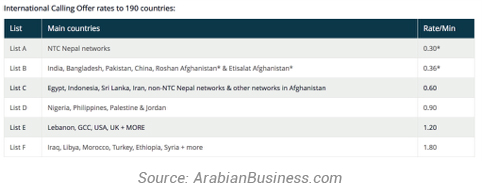
Inbound Call Rates
The same high rates apply if you were trying to reach a mobile or landline inside the UAE. Call rates into the UAE via Skype start at 27.5¢/min, and calls into Qatar start at 39¢/minute.
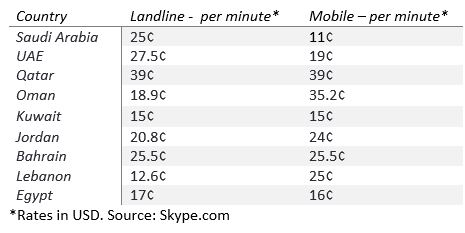
In contrast, Skype calls into the following non-Middle Eastern countries remain relatively low at around 2.3¢/minute for landlines and up to 10¢/minute for mobile calls.
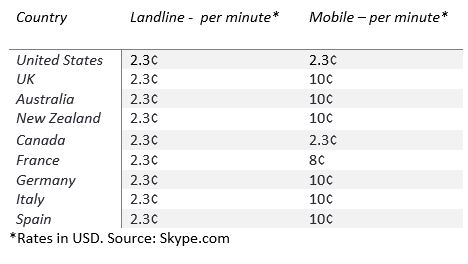
Teleconferencing
It is impossible to purchase a local phone number for use outside the country. Unlike the US, where you can use a US phone number abroad, you cannot purchase a local UAE phone number for use in other countries.
This limitation at times has an impact on teleconferencing services as phone number integration [in addition to VoIP services] is not available in many GCC countries.
To join a conference line via mobile in this region, you will likely need to pay expensive long-distance charges when dialing into another supported international line.
Beware of VPN fines
It is important to familiarize yourself with the laws of your country prior to using a VPN. In 2016, the UAE regulatory authority outlawed the use of VPNs to access any blocked material, including VoIP services and conference lines offered by third parties. Breaking this law can incur fines reaching 500,000 AED ($136,000 USD), serving as a strong deterrent. Oman also is another country to have banned VPN use for VoIP calls.
In other countries like Qatar, the governments block VoIP providers, but doesn’t criminalize associated VPN use. Keep yourself protected by abstaining from using a VPN until you are absolutely confident of the associated legalities.
Local Alternatives
It is clear that there may not always be a way around the block, and the few legal VoIP options available are far from ideal. That said, a few telecom providers have their own unlimited voice and video calling plans through their own apps.
In the UAE, C’Me and BOTIM’s monthly fees start at AED 50 ($14 USD) and can cost up to 100AED ($27 USD) for family plans. In order to use these services, all parties located in the UAE must create an account and pay the monthly fee. Unfortunately, however, C’Me and BOTIM have notoriously poor connections, making them unappealing options for those used to efficient Skype services.
OoredooTalk in Oman operates on a similar system as Skype, and is the only licensed VoIP calling app in the country that allows customers to call international fixed or mobile lines. While this service charges similar fees to Skype in this region, it isn’t available for roaming due to the restrictions surrounding the use of local phone numbers.
What this means for businesses
As you can imagine, the aforementioned restrictions on video-calling technology are making communication extremely difficult for businesses in the Middle East. These telecom monopolies are accused hampering the launch of start-up companies and stunting the international expansion of small-to-medium businesses. Larger corporations do not have to rely as heavily on public VoIP applications, but smaller businesses are deterred from expanding their operations in the GCC due to the high international call rates.
Changing Landscape
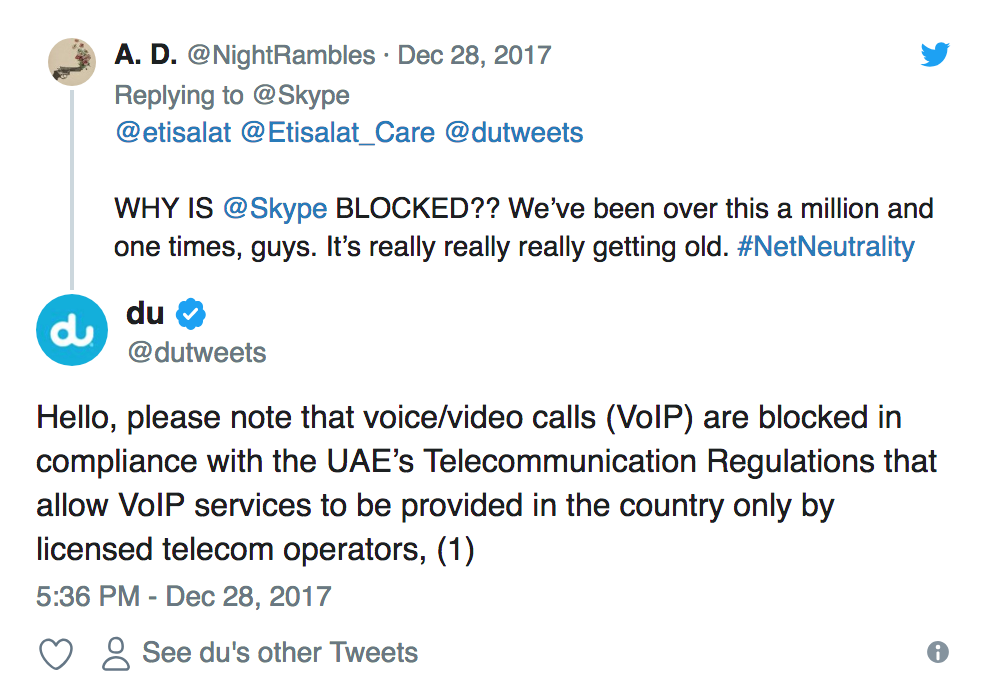 It is important to remember that these countries modify telecommunication laws every few weeks to every few years. Frustrated expats and international businesses across the GCC are calling for a lift on these bans, and some countries are listening.
It is important to remember that these countries modify telecommunication laws every few weeks to every few years. Frustrated expats and international businesses across the GCC are calling for a lift on these bans, and some countries are listening.
Saudi has recently taken steps to remove their VoIP bans in efforts to attract more business to the country. The government recognizes that digital de-regulation will incentivize the growth of internet-based businesses, particularly in the media and entertainment industries. Even this past spring, UAE telecoms regulators were in talks with Microsoft over lifting the ban on Skype VoIP calls.
While the current landscape is heavily regulated and restricted at this time, the situation may change in the not-too-distant future.
Key Takeaways
If you are considering moving your business operations to the Middle East, be prepared to face significant challenges when setting up communication channels. There may be intermittent periods where you can get around the VoIP ban, but during these instances, the bandwidth is may be limited and the connection is unreliable
Remember to research your target countries’ laws and regulations before you turn to VoIP services for your business, and be prepared to consider local VoIP alternatives as an option. No matter the service, remain informed of changing regulations and prepare for exorbitant calling costs.
Written by: Sidney Hardin
Sources:
http://www.analysysmason.com/Research/Content/Regional-forecasts-/communication-services-mena-rdmv0/
https://gulfnews.com/business/sectors/telecoms/whatsapp-video-voice-calls-blocked-again-1.2047642
https://en.wikipedia.org/wiki/Zain_Group
http://www.ooredoo.om/Personal/Mobile/Mousbak/OoredooTalk-VoIP.aspx
https://www.comparitech.com/blog/vpn-privacy/best-vpns-dubai-uae/
https://lovindubai.com/lifestyle/technology/etisalat-du-skype-block
Jordan Boshers
Jordan Boshers is the Chief Digital Strategist at IstiZada, a digital agency that helps companies market to Arabs. He has 12+ years of experience running successful digital marketing campaigns in the Arab world. His insights into Arabic SEO helped him grow previously unknown websites to dominate Arabic niches on Google including growing one site from 0 to more than 2.5 million users monthly. Jordan has consulted for hundreds of companies including helping corporations like Amazon, Berlitz, and Exxon Mobil with their Arabic digital marketing. Learn more here or on LinkedIn.
View all posts by Jordan Boshers
